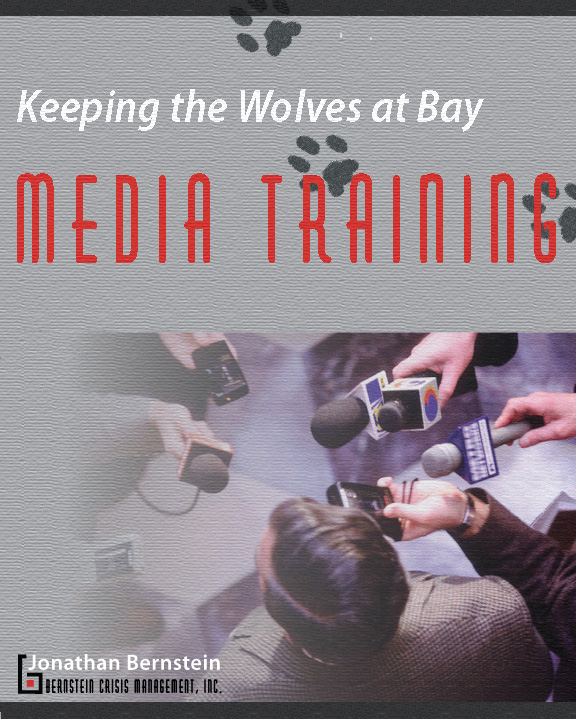|
JUST A THOUGHT
| |
The Internet is just a world passing around notes in a classroom.
Jon Stewart |
|
FROM THE EDITOR
This issue's first article, 10 Self-Exam Questions for Online Reputation Management, originated as some thoughts I'd jotted down for a prospective client to consider, a client unsure of its own needs in this area. I hope you find it useful, and welcome your feedback!
Then, Richard Levick returns to the pages of Crisis Manager with an excerpt from his marvelous new book, The Communicators - Leadership In the Age of Crisis. When I saw the title of this book segment, I knew that I had to publish it! Richard kindly gave me his permission to do so.
If you want more than just the education offered by this ezine, please consider browsing the Bernstein Crisis Management blog
I manage with my son Erik and the Crisis Management blog I host over at Carter McNamara's Free Management Library.
As always, if you like what you see, please share it with others by using the "Forward Email" link at the bottom of the ezine and tell them to subscribe! IMPORTANT NOTE: If you just "Forward" using your own email program's "Forward" function and your recipient thinks they're being spammed, they can click on the Opt Out link and opt YOU off the list. So use the "Forward Email" link, please.

My best to all,
Jonathan
|
10 SELF-EXAM QUESTIONS FOR ONLINE REPUTATION MANAGEMENT
By Jonathan Bernstein
| Think you're ready to preserve your reputation online? Take this self-exam honestly and you'll know the answer.
1. Do you have a very Internet and social media-savvy staff member or consultant on your crisis management team? If not, the rest of these questions are moot, your car is heading for a brick wall at high speed, and you aren't wearing a seatbelt. 2. Are your spokespersons trained in the differences between online and off-line communications?3. How closely does your organization monitor the Internet for current or potential reputation threats?4. How closely does your organization monitor the Internet for early reports of crises/disasters-in-progress, or of incidents that can become crises/disasters? Often Twitter is the first place such incidents are reported. 5. [If you're publicly held] How closely does your organization monitor the Internet for potential reputational threats to your organization's stock value? There is usually a lot of Twitter chatter about public stocks, and similar conversations via most forms of social media.6. Does your organization currently have a system for rapid/concurrent distribution of information to prominent social media points of presence (e.g., Twitter, Facebook, YouTube)? 7. Has your organization considered the use of a virtual (online) incident command system to allow crisis team members to gather, exchange and disseminate information from a single online location, regardless of their own physical location?8. Does your organization currently have a disaster-related "dark site" (website or blog that only gets "turned on" during a crisis) set up to facilitate both outbound and inbound communication from external stakeholders?9. Does your organization currently have a system for using Internet-centered communications to reach all of your important stakeholder groups, internal and external, in the event of disasters or other crises?10. Does your organization know the capability of its primary website/server to handle a hundredfold, or thousandfold increase in traffic that could result from a disaster - i.e., would that increase "crash" the site, leaving those seeking information frustrated/angry and likely to lash out? 2. Are your spokespersons trained in the differences between online and off-line communications?3. How closely does your organization monitor the Internet for current or potential reputation threats?4. How closely does your organization monitor the Internet for early reports of crises/disasters-in-progress, or of incidents that can become crises/disasters? Often Twitter is the first place such incidents are reported. 5. [If you're publicly held] How closely does your organization monitor the Internet for potential reputational threats to your organization's stock value? There is usually a lot of Twitter chatter about public stocks, and similar conversations via most forms of social media.6. Does your organization currently have a system for rapid/concurrent distribution of information to prominent social media points of presence (e.g., Twitter, Facebook, YouTube)? 7. Has your organization considered the use of a virtual (online) incident command system to allow crisis team members to gather, exchange and disseminate information from a single online location, regardless of their own physical location?8. Does your organization currently have a disaster-related "dark site" (website or blog that only gets "turned on" during a crisis) set up to facilitate both outbound and inbound communication from external stakeholders?9. Does your organization currently have a system for using Internet-centered communications to reach all of your important stakeholder groups, internal and external, in the event of disasters or other crises?10. Does your organization know the capability of its primary website/server to handle a hundredfold, or thousandfold increase in traffic that could result from a disaster - i.e., would that increase "crash" the site, leaving those seeking information frustrated/angry and likely to lash out?
|
LAWYERS DON'T DRIVE THE BUS
They're Only Sitting Near the Front
By Richard S. Levick and Charles Slack
The following commentary is excerpted from the book, The Communicators: Leadership in the Age of Crisis, by Richard S. Levick and Charles Slack (Watershed Press, 2010), available in both electronic and hardback form at Amazon.com.
We wouldn't think of doing business without strong legal counsel, and you wouldn't, either. But you are not compelled to always take their advice, or accord them overriding authority within your crisis team.
 | | Richard S. Levick |
"A lot of companies have their crisis management under the auspices of general counsel or outside counsel. I think that is an enormous mistake," says Steven C. Parrish, who retired in March 2008 as senior vice president of corporate affairs at Altria Group, the parent of Philip Morris. Parrish, by the way, is a lawyer who has served as both a corporate general counsel and outside counsel. "Under the code of professional responsibility you cannot, you are not allowed to take off your lawyer hat," he says. "You have to protect the legal interests of the company. That, by definition, appropriately requires counsel to be very conservative and cautious about what is said to the public and what is said to the employees."
While caution is thus mandated in its place, the desire to stay out of legal trouble can create a debilitating tunnel vision if it defines your crisis strategy. Says Parrish, "You can manage a crisis so that you never get sued, but [in the end] you can lose by having your reputation destroyed because there's no communication, or it's the wrong communication." A lawyerly press release or public statement is often as dangerous as no statement at all. Legal language, so vital and appropriate in the courtroom or in contract negotiations, won't help you win cases in the court of public opinion during a crisis.
Parrish cites a well-known Philip Morris case from the mid-1990s, when chemical impurities accidentally introduced during the manufacturing process tainted Marlboro and other brands of cigarettes, causing an unpleasant taste and eye, nose, and throat irritation in some smokers. Although the problem affected only a small percentage of production and resulted in no serious injuries or deaths, Philip Morris responded quickly with a massive recall and public information campaign. The campaign ultimately succeeded in limiting the scope of the crisis, yet Parrish recalls that the crisis management team's efforts were at first impeded by lawyerly meddling.
"One of the things we did wrong during the recall [was that] we had lawyers with way too much influence over the press releases," Parrish recalls. "They were, in a couple of instances, incomprehensible." In an industry such as tobacco, where public skepticism already abounds, clear communication is vital. Parrish adds, "When people can't understand [a release], or it's obviously written by a lawyer, people don't trust what you're saying." If you don't present your statements and intentions in plain English, you invite derision from legions of confused reporters, bloggers, politicians, and pundits. Worse, you invite them to do their own translating, making serious and potentially damaging mistakes along the way.
As a crisis breaks and you're ready to go forward with a statement laying out the facts, and what you plan to do to correct the situation, by all means, show it to counsel. But be prepared for her to get out her red pen. "You can't say that," she'll warn you. "Three years from now someone's going to call that up and use it as the basis of a lawsuit." Don't get angry. It's her job to tell you that. But don't tear up that statement, either. Your job is to look her in the eye and say that without bold action, in three years you may not have a company at all.
Richard S. Levick, Esq., is the president and chief executive officer of Levick Strategic Communications, a crisis and public affairs communications firm. He is the co-author of The Communicators: Leadership in the Age of Crisis and Stop the Presses: The Crisis & Litigation PR Desk Reference, and writes for www.bulletproofblog.com. Mr. Levick was honored in two consecutive years (2009-2010) on the prestigious list of "The 100 Most Influential People in the Boardroom" by the NACD and Directorship Magazine. Reach him at [email protected].
| |
BUSINESS ANNOUNCEMENTS
(aka blatant self-promotion)
Keeping the Wolves at Bay: Media Training What has 80+ pages of hard-hitting, entertaining and easy-to-read guidance on how to deal with both traditional and online media during times of crisis? The answer is
Keeping the Wolves at Bay - Media Training. The, four-color, perfect-bound, 8x10 manual is currently available both in hardcopy ($25) and PDF form ($10). Volume discounts are available; write to Jonathan Bernstein for that information.
Here's a couple of teaser reviews for you: Jonathan Bernstein's Keeping the Wolves at Bay is an eminently practical guidance for anyone - business leader, celebrity, politician - who must willingly or unwillingly face the glare of media attention. It appears
at a moment in time when the social media and other digital communications have upped the ante exponentially.
Bernstein's practicum on media relations takes on renewed urgency as news, gossip, and opinion now drive
public perception virally and at the speed of light.
Richard Levick, Esq.
President & CEO
Levick Strategic Communications, LLC
Even if you think you'll never, ever be interviewed by the media, buy this book and read it cover to cover. It isn't a substitute for media training. But it will give you the tools and confidence to go head to head -- and possibly even defang -- rabid reporters, blood-thirsty bloggers and social networking buffoons who are out to besmirch your good name. Joan Stewart, The Publicity Hound
The book and other products can be found at the Crisis Manager Bookstore
Want To Blog And Tweet About
Your Organization But Don't Have Time?
Missing out on all the promotional and SEO advantages of doing so? Hire someone to be your voice...like Erik Bernstein, aka "Son of Crisis Manager."
More info:[email protected]. The Art of Celeste Mendelsohn 
This has NOTHING to do with crisis management, but I have to brag on the launch of the new website launched to feature the art of Celeste Mendelsohn -- my wife, partner and Creative Director. This image is Yin-Yang, painted on a wood round. Her work also includes plates, masks, yoga asanas, computer art and even needlework.
|
GUEST AUTHORS
GUEST AUTHORS are very welcome
to submit material for "Crisis Manager." There is no fee paid, but most
guest authors have reported receiving business inquiries as a result of
appearing in this publication. Case histories, experience-based
lessons, commentary on current news events and editorial opinion are
all eligible for consideration. Submission is not a guarantee of
acceptance.
|
|
ABOUT THE EDITOR & PUBLISHER
Jonathan Bernstein is president of Bernstein Crisis M anagement, Inc., a national crisis management public relations agency providing 24/7 access to crisis response professionals. The agency engages in the full spectrum of crisis management services: crisis prevention, response, planning & training. He has been in the public relations field since 1982, following five-year stints in both military intelligence and investigative reporting. Write to [email protected]. anagement, Inc., a national crisis management public relations agency providing 24/7 access to crisis response professionals. The agency engages in the full spectrum of crisis management services: crisis prevention, response, planning & training. He has been in the public relations field since 1982, following five-year stints in both military intelligence and investigative reporting. Write to [email protected].
|
|
LEGAL DISCLAIMERAll information contained herein is obtained by Jonathan Bernstein from sources believed by Jonathan Bernstein to be accurate and reliable. Because of the possibility of human and mechanical error as well as other factors, neither Jonathan Bernstein nor Bernstein Crisis Management is responsible for any errors or omissions. All information is provided "as is" without warranty of any kind. Bernstein Crisis Management and Jonathan Bernstein make no representations and disclaim all express, implied, and statutory warranties of any kind to the user and/or any third party including, without limitation, warranties as to accuracy, timeliness, completeness, merchantability, or fitness for any particular purpose.
Unless due to willful tortuous misconduct or gross negligence, Jonathan Bernstein and Bernstein Crisis Management shall have no liability in tort, contract, or otherwise (and as permitted by law, product liability), to the user and/or any third party.
Under no circumstance shall Bernstein Crisis Management or Jonathan Bernstein be liable to the user and/or any third party for any lost profits or lost opportunity, indirect, special, consequential, incidental, or punitive damages whatsoever, even if Bernstein Crisis Management or Jonathan Bernstein has been advised of the possibility of such damages.
A service of this newsletter is to provide news summaries and/or snippets to readers. In such instances articles and/or snippets will be reprinted as they are received from the originating party or as they are displayed on the originating website or in the original article. As we do not write the news, we merely point readers to it, under no circumstance shall Bernstein Crisis Management or Jonathan Bernstein be liable to the user and/or any third party for any lost profits or lost opportunity, indirect, special, consequential, incidental, or punitive damages whatsoever due to the distribution of said news articles or snippets that lead readers to a full article on a news service's website, even if Bernstein Crisis Management or Jonathan Bernstein has been advised of the possibility of such damages. Authors of the original news story and their publications shall be exclusively held liable. Any corrections to news stories are not mandatory and shall be printed at the discretion of the list moderator after evaluation on a case-by-case basis.
|
|
|
|